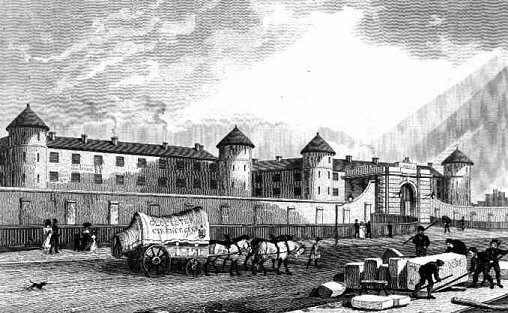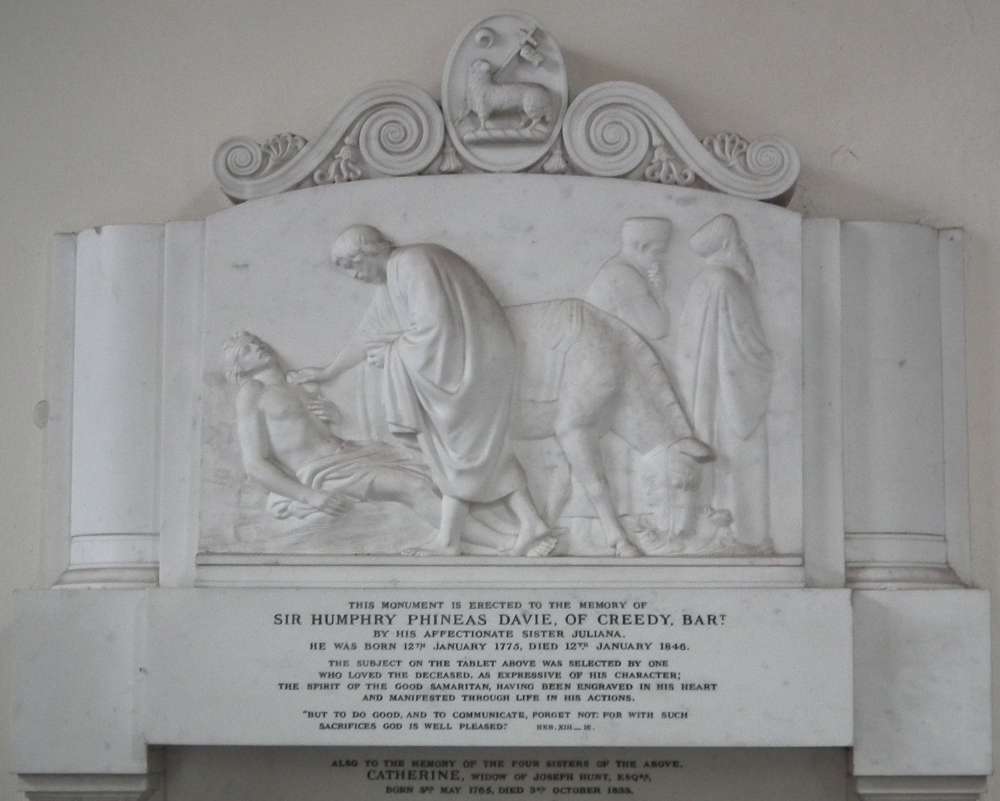John Phelp - Sir Humphrey Davie's Gamekeeper
Friends in High Places
In March 1829, John Phelp, 49, of Sandford was convicted of the manslaughter of 24 year old John Burton on 24th January that year and sentenced to be transported for seven years.
Burton had come to Devon from Leicestershire with his brother; they were hawkers of earthenware goods. That Sunday they had gone skating with a few friends on the frozen-over duck pond at Creedy Park belonging to Sir Humphrey Davie.
John Phelp was Davie’s game keeper. Returning from church, Phelp saw the men and a dog on the ice and ordered them off the property, threatening to shoot the dog. John Burton argued with Phelp, who accused him of trespassing. Burton taunted him, offering to pay him a penny. The others all climbed over the wall. Burton was the last to go and sat on the wall, was about to jump down onto the road when Phelp hit him over the head with the barrels of his shot gun. Burton fell to the ground, unconscious, bleeding from his ears. He was carried to the lodge at the gate to Creedy where he was attended by Stephen Hugo, a surgeon from Crediton. He died, of a depressed skull fracture, at seven o’clock that evening.
Two days after the death an inquest was held at the Long Barn in Sandford when a verdict of manslaughter was returned. Phelp was remanded in gaol.
Born in Oxfordshire, he was married with nine children. He had worked previously for Lord Sherborne in Gloucestershire, Charles Beckford Long in Hampstead Norreys, Berkshire, and then for his nephew Charles Devon who owned the manor house in Rackenford near Tiverton. He had been appointed bailiff or game keeper to Sir John Davie about six years previously and continued working for Sir Humphrey Davie after the death of Sir John in 1824.
At the assizes in Exeter fourteen character witnesses spoke on behalf of Phelp. Then “his excellent master” Humphrey Davie – who as Sheriff of Devon had greeted the judges when they arrived for the assizes – declared that “there never was a better or more faithful servant, nor until this transaction, he believed a better man,-a character he had uniformly borne through a service in successive families before he came into that of the late Sir John Davie…” After a few moments deliberating, the jury found him guilty of “a very aggravated manslaughter” and the sentence of transportation was given.
In March 1829 Davie wrote to Sir Robert Peel (Home Secretary) requesting that Phelp may remain in gaol. He said that "up until the time of the crime his servant was a humane, religious and peaceable and well disposed man. He really believed that removal [to a prison hulk] where he must necessarily associate with persons of the worst description, in company with the outcasts of society would be a punishment as severe as death itself."
The sentence was commuted to 5 years imprisonment. Phelp entered the Penitentiary at Millbank, London, (right) on 14 April 1829.
In June 1829, Anthony White the surgeon at the penitentiary wrote that Phelp had been depressed by flashbacks of the man he killed, suffered from head pain and was admitted to the infirmary and was very likely to become maniacal.

A September 1830 report from prison said he was subject to a determination of blood to the brain, probably as a result of close confinement but that his conduct had been most exemplary. Shortly afterwards he was released to the care of his brother back in Oxfordshire. In 1851 he and his wife were living in Berkshire.

The monument to Sir Humphrey Davie, where he is represented as “The Good Samaritan”, in Sandford Church.
Sir Humphrey Phineas Davie, 10th Baronet of Creedy (1775–1846) inherited the title on the death of his nephew Sir John Davie in 1824. On Sir Humphrey’s death in 1846 the baronetcy became extinct. However his niece’s husband, Henry Ferguson, was created the first Ferguson Davie baronet of Creedy in 1847, after he had assumed the surname of Davie.
by Peter Selley
